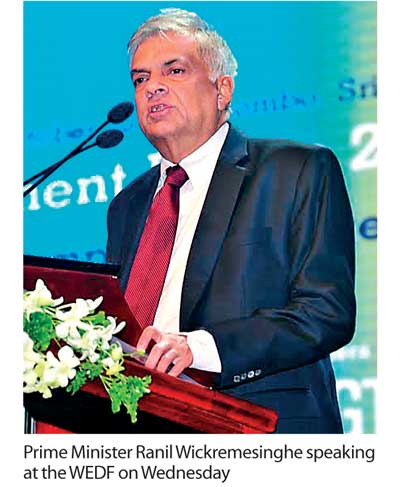17 Oct 2016 - {{hitsCtrl.values.hits}}
 Prime Minister Ranil Wickremesinghe speaking at the World Export Development Forum (WEDF) sessions at the BMICH on Wednesday said that the Economic Cooperation and Technical Agreement (ETCA) with India that will be signed soon, will enable Sri Lanka to have closer engagement with India, especially the five southern states, which together with India are the fastest growing segment of the Indian subcontinent and at the moment have a combined gross domestic product (GDP) of US $ 500 billion.
Prime Minister Ranil Wickremesinghe speaking at the World Export Development Forum (WEDF) sessions at the BMICH on Wednesday said that the Economic Cooperation and Technical Agreement (ETCA) with India that will be signed soon, will enable Sri Lanka to have closer engagement with India, especially the five southern states, which together with India are the fastest growing segment of the Indian subcontinent and at the moment have a combined gross domestic product (GDP) of US $ 500 billion.
He also said Sri Lanka is negotiating another free trade agreement (FTA) with Singapore and they are very receptive because they believe that Bay of Bengal countries will be fast-growing countries with fast-growing incomes in the next 20-30 years. Under the Chinese One Belt initiative, with China Sri Lanka is also negotiating an FTA and a comprehensive economic partnership dialogue with Japan.
The prime minister’s move to fast track the FTAs with Singapore and China and the ETCA with India is with a view to generate new investments and jobs. He knows we cannot protect our economy by stagnating behind tariff walls. The best protection possible is a mutual lowering of tariff barriers among friendly nations so that all may benefit from the free flow of goods. Increased economic activity resulting from increased trade will provide more job opportunities for our young workers.
 Our industry, our agriculture, our services will benefit from increased export opportunities as other nations agree to lower their tariffs. Increased exports and imports will benefit our ports, steamship lines and airlines as they handle an increased amount of trade. Lowering our tariffs will provide an increased flow of goods for our consumers.
Our industry, our agriculture, our services will benefit from increased export opportunities as other nations agree to lower their tariffs. Increased exports and imports will benefit our ports, steamship lines and airlines as they handle an increased amount of trade. Lowering our tariffs will provide an increased flow of goods for our consumers.
Our industries will be stimulated by increased export opportunities and by freer competition with the industries of other nations for an even greater effort to develop an efficient, economic and productive system. The results can usher in a dynamic new era of growth unlike in the past where exports dwindled and Sri Lanka had to rely more on remittances and foreign loans.
Growth in exports
Exports are probably part of the answer of where we will find job growth. However, the issue of exporting our way to job growth is harder than it appears. When a country exports goods, it sells them to a foreign market, that is, to consumers, businesses or governments in another country. Those exports create opportunities and bring foreign money into the country, which increases the exporting nation’s GDP.
So, at a time when good jobs are in short supply, building exports is an imperative. But as we boost our exports we will have to start producing more goods that are more labour intensive, that way as exports grow, it will become a more productive engine. Therefore, job growth isn’t just about where jobs are today; this is where jobs for our young Sri Lankans will be tomorrow. They need to be future ready.
Today, the world’s powerful customers and fastest-growing markets are beyond our borders. So, if we want to find new growth streams, if we want to find new markets and new opportunities, we’ve got to compete for those new customers—because other nations are competing for those customers day and night.
Often changes in international markets can have a direct, positive or negative impact on a country. Such an impact may be a result of exogenous shocks (climate change), large market failures (e.g. financial crisis, high volatility in world prices), international agreements (e.g. multilateral or regional trade agreements) and unilateral policies of large economies (e.g. agricultural domestic support or biofuel mandates).
While the effects of these changes vary across countries, depending on their trade specialization, degree of openness and adjustment capacities, the domestic redistributive impact among citizens in a particular country can be quite pronounced. Trade matters only to the extent that it affects the direct determinants of poverty and that, relative to the whole range of other possible policies, it offers as an efficient policy lever for poverty alleviation.
Trade liberalization may have adverse consequences for some – including the poor – that should be avoided or managed to the greatest extent possible. However, the general belief is that trade liberalization promotes growth, which in turn, supports poverty alleviation and therefore, only a few people will end up as net losers.
Trade barriers must go
More compelling for free trade is the dramatic upturn in the GDP growth rates in India and China after they turned strongly towards dismantling trade barriers in the early 1990s. In both countries, the decision to reverse protectionist policies was not the only reform undertaken but it was an important component. In developed countries trade liberalization, which started earlier in the post-war period, was accompanied by other forms of economic opportunities for example, a return to currency convertibility, resulting in rapid GDP growth.
Moreover, the argument that historical experience supports the case for protectionism is now flawed. The economic historian Douglas Irwin has challenged the argument that 19th century protectionist policy aided the growth of infant industries in the United States. Nor should the promoters of free trade worry that trade openness results are a chaos for some developing countries. Trade is only a facilitating device. If a country’s infrastructure is bad or has domestic policies that prevent investors from responding to market opportunities such as licensing restrictions, very little progress can be achieved.
Critics of free trade also argue that trade-driven growth benefits only the rich and not the poor. In India, for example, after the economic and education reforms nearly 200 million people have come out of poverty. In China, which grew faster, it is estimated that more than 300 million people have moved out of the poverty line since the reforms were initiated. Every major trading nation today is actively negotiating bilateral and regional FTAs. However, for FTAs to work for Sri Lanka, we need to work hard to improve our competitiveness and change the way we run our administration.
(Dinesh Weerakkody is a thought leader)
10 Jan 2025 26 minute ago
10 Jan 2025 31 minute ago
10 Jan 2025 2 hours ago
10 Jan 2025 2 hours ago
10 Jan 2025 2 hours ago